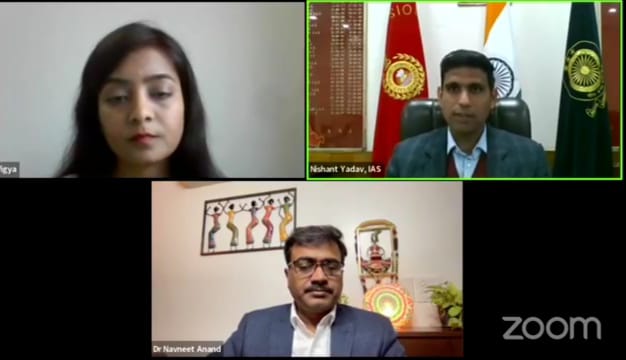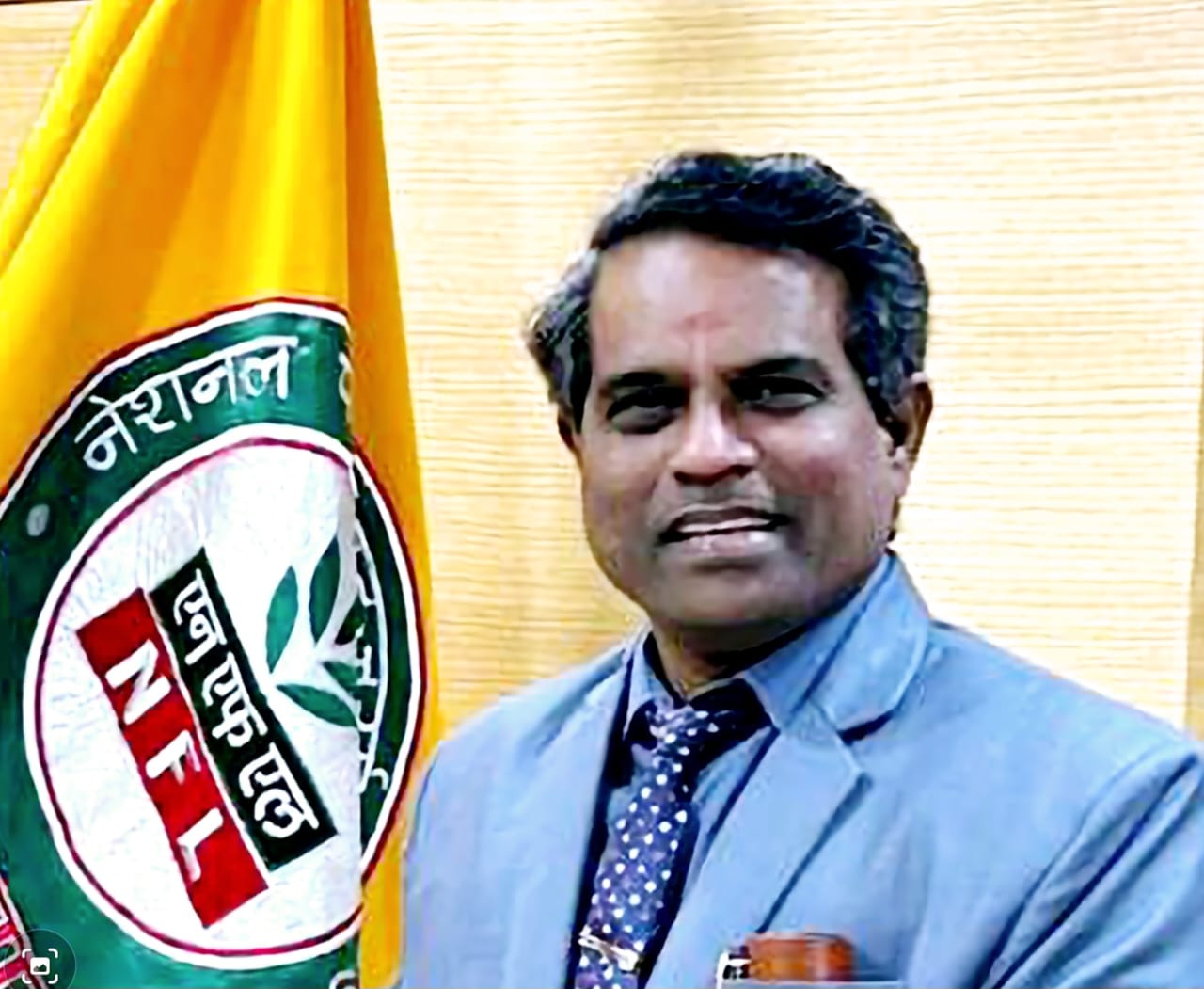IIT Delhi taught me hard work & resilience; I use it effectively as an IAS: Nishant Yadav, DC, Karnal
Author: Navneet Anand & Vigya Dwivedi

New Delhi: An alumnus of IIT-Delhi, Nishant Yadav got into the prestigious Indian Administrative Service at 23, by clearing the Civl Services in his very first attempt. Post his BTech he was serving at the Royal Bank of Scotland as a Business Analyst, but the passion of serving people compelled him to opt for the Civil Services. There has not been a looking back for him ever since. From efficient handling of the reservation agitation as SDM Sonipat, to effective methods of recruitments as Secretary of Haryana Public Service Commission, Yadav has excelled everywhere.
His out-of-the-box approach, technological interventions and urge to help the needy efficiently are amply reflected in the transformation of Karnal, a historical city of Haryana.
In an exclusive interview with Bureaucrats India Editor-in-Chief Navneet Anand and Assistant Editor Vigya Dwivedi , Karnal Deputy Commissioner Nishant Yadav shares his vision for good governance, experience and many more things. From his native place of Behror in Alwar, Rajasthan to Karnal in Haryana, his journey so far has been incredibly remarkable.
From Behror in Alwar to Karnal – though the distance is not too much, the journey has been remarkable. An IIT Delhi graduate, business analyst with Royal Bank of Scotland and then Civil Services! Help us with your early life journey.
I was born in a village near Behror in Alwar, Rajasthan. My father is a retired government school principal. Mother is still working as a teacher in a government school. I did my initial schooling till Class V in village primary school itself. From Class IX onwards I took my education in a nearby town. My graduation from IIT-Delhi proved a turning point in my life which helped me transform my dreams and career. I worked at Royal Bank of Scotland (RBS) as a business analyst for one year after which I realized that I need to work at the grassroots level. I left my job, prepared for UPSC, got selected in the first attempt in 2013 and was appointed as SDM, Sonepat, Haryana, later.
How do you integrate your learning at IIT-Delhi and experiences at Royal bank of Scotland (RBS) into your role in Civil Services?
The learning and training we received at IIT-D will be cherished forever since it taught us to work for long hours and that too under high pressure. Our education in IT helps us to bring much needed technological interventions in an advanced state like Haryana with a significant IT penetration. During Covid-10 pandemic, we created an app called ‘Karnal Live Tracker’ to track patients in home isolation
You did a commendable job in handling law and order situation in Sonepat as the SDM during the reservation agitation in 2016. Please share with us the challenges you faced as a young IAS officer during this incident. What were the lessons?
It was a very difficult period both as an administrator and as a general citizen. I had joined service just three months back when the agitation happened in 2015. The key learning from the incident was that communication is the most important in such situations. We took help from elders and senior leaders among the community in controlling the situation. With the help of good communication and timely steps, the situation was soon brought to control.
During your tenure as Additional DC, Karnal, the district ranked 7th in the country in terms of maintaining rural cleanliness! How was it achieved?
The ADC is in-charge of rural administration. For Swachhata Survekshan 2018, we planned to segregate biodegradable and non biodegradable wastes. We had put in place ‘Kachara Sheds’ in villages where as biodegradable waste was used by villagers for vermi composting and non-biodegradable waste was sold in cities. Similarly, liquid waste was purified with the help of waste stabilization ponds. To my satisfaction, these practices are still continued.
You have also taken many steps towards encouraging women empowerment and employment in Karnal. Please share some insights with us.
In Karnal, seven new women colleges are under progress and will be completed by the end of 2022. Also we have done a lot of work in the development of women SHGs. Presently, 4000 SHGs are working in Karnal which are connected to 40,000 families. We encourage skill development and self-employment among women and have made it mandatory for all government offices to have women employed in canteens. We also ran a campaign to make village women anemia free.
Is it easier to do information, communication and education among citizens now as compared to the past?
Yes, due to increasing awareness, it is much easier now to have community mobilization for a cause. People know what is good for them and they show confidence in us.
Under you as Secretary, Haryana Public Service Commission (HPSC) conducted recruitment for 166 HCS (Haryana Civil Service) and Allied Posts, one of the biggest and fairest recruitment of Civil Servants in Haryana till date. Not only this, HPSC also recruited more than 3000 Class I officers at different posts within a period of one year. A commendable feat given that recruitment are a tricky subject to deal with! Your thoughts, please!
We had a very clear mandate to do a quick and fair mandate. I visited UPSC several times to adopt some of their best practices in written examinations and interviews. Within one year, we recruited more than 3000 Class-I officers including 166 officers of Haryana services and allied services batch. It was the biggest recruitment ever done by HPSC in a single batch. It also helped in improving the credibility of HPSC among people. It was certainly a very satisfying experience.
‘Adopt a family,’ one of your brainchild as DM, Karnal, which was appreciated by the Union Government during Covid-19 since it led to the adoption of more than 15,000 poor families. How did your team ensure that no beneficiary is left out?
Karnal is an industrial town. When industries shut down during Covid-19, it made it very difficult for many to run their families. The Karnal Administration decided to take their responsibility. It reached to industrialists, officers, etc., and requested them to join our campaign under which we supplied ration kits to poor families. We also supplied two meals a day at some places. We had more than 400 volunteers which reached out to more than 15,000 families. We also had a round the clock helpline number 1950 for the same. The initiative was appreciated by the Central government in one of its bulletins.
How prepared is Karnal for the possible third wave of Covid-19?
During the second wave, we had 95 per cent of home isolation cases. We launched Karnal Sanjivani Pariyojana under which we supplied kits of important medication as well as thermometers, oximeters, etc., to patients in home isolation. We also delivered online consultations regularly with the help of Kalpana Chawla Medical College. We have strengthened this initiative for the third wave. As per the data of the third wave, so far we have only two per cent hospitalization cases. We also have more than 1000 oxygen beds and at every CHA level we have an oxygen PSA plant.
How would you describe Karnal’s growth in recent years? The Haryana Government has recently written to NCR Planning Board to consider reducing Haryana’s size in the NCR as it is causing avoidable issues. Help us to understand this.
Karnal has seen rapid development in the last few years. It now has better connectivity with all its neighboring districts. Also, a ring road project worth Rs 1700 crore is lined up. Karnal Rapid Rail project is also underway, which will reduce distance between Delhi and Karnal to 1.5 hours. Since Karnal lies in the NCR zone, all industrial restrictions in NCR affect Karnal negatively, especially in winters. That is why we have written to the state government to exclude the entire district from the NCR.
Tell us something about the ‘Land Bank’ in Karnal?
Land acquisition has become very difficult after the launching of the Land Acquisition and Rehabilitation Act 2017. Therefore we have come up with a project in which we create ‘Land Banks’ containing all the unused government land details at a place. These lands can be later used whenever any department plans projects.
How do you see 2022? What are your plans for Karnal, and for yourself?
Our major aim right now is to tackle the third Covid-19 wave with the best preventive and treatment measures. Among development projects, I have already discussed ring road which will give a major infrastructural boost to the district. Other than that we have airport, elevated flyover and stadium projects lined up as well. Hopefully, development will take place at a faster rate in 2022.
What has been your most cherishing experience in all these years in Civil Services?
Every day is learning. The experience I cherish the most is that of HPSC recruitment. Also, work done for home isolated patients and migrant workers during Covid-19 motivates me.
As a young IAS officer, please share a message for our young generation.
I would advise them to keep dreaming big, working hard and never settle for less no matter what. I would also advise them to go for services which make them contribute towards society.



